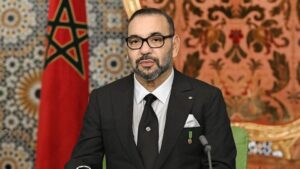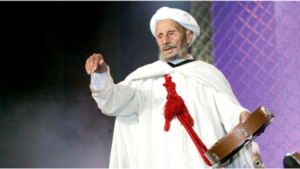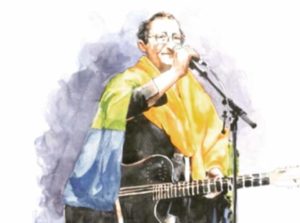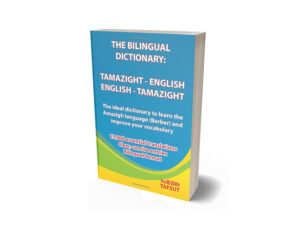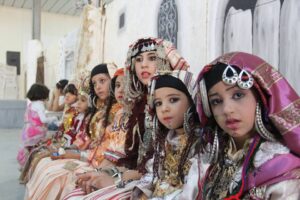Amazigh first names and their meaning in English
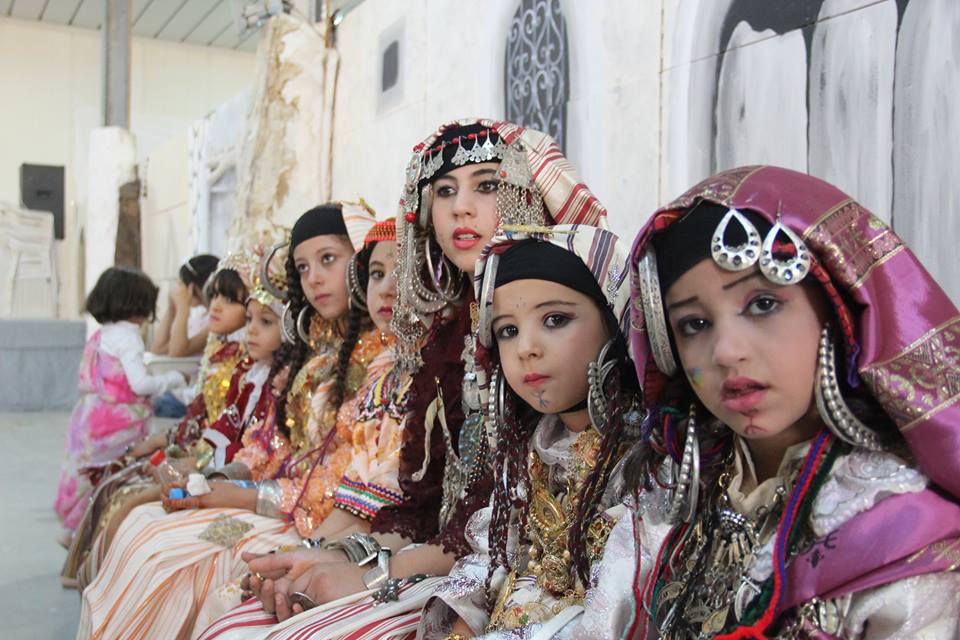
First names for girls:
ⴰⵏⵢⴰ [ Anya ] : Melody.
ⴱⴰⵢⴰ [ Baya ] : Traditional name (central Morocco, Kabylia, Tuareg).
ⴱⵉⵜⵉ [ Biti ] : Traditional name (Atlas), Biti is a term used to cherish infants (Souss). Variant: Bitti.
ⴷⴰⵎⵢⴰ [ Damya ] : Another presumed name for Dihya. Also attested in Souss and among the Tuaregs.
ⴷⴰⵙⵉⵏ [ Dasin ] : Tuareg name. Dassine oult lhemma (1885-1938) was famous for her beauty, intelligence and mastery of the Amzad (one-stringed lute).
ⴷⵉⵀⵢⴰ [ Dihya ] : Name of the famous “Queen of the Aurès” who reigned over several Amazigh tribes, including her own, that of the Jarawa. Dihya led a fierce resistance against the Arab invasion.
ⴽⵍⵍⴰ [ Klla ] : Name of the daughter of Tinhinan, queen of the Tuaregs of Ahaggar. Also attested in Kabylia and central Morocco. Variant: Kwlla.
ⴽⵓⵏⴷⴰ [ Kunda ] : Diminutive of takunda, the ladybug.
ⵉⵣⵣⴰ [ Izza ] : Traditional name (Morocco).
ⵍⴻⵍⵍⵉ [ Lelli ] : Diminutive of Tilelli, freedom.
ⵎⴰⴷⵍ [ Madl ] : The Milky Way (Ayr). Attested among the Tuaregs of Ayar / Ayr (Aïr mountains).
ⵎⴰⵙⵉⵍⵢⴰ [ Masilya ] : From an ethnonym: the Massyles, a Numidian dynasty.
ⵎⴰⵜⵢⴰ [ Matya ] : First name of Dihya’s mother.
ⵎⴰⵢⴰ [ Maya ] : First name derived from “Mary”.
ⵎⵉⵔⴰ [ Mira ] : Means “grace”: Mera.
ⵎⵓⵏⵉⴽⴰ [Monika] : Saint Monica, born around 332 in Thagaste (in present-day Algeria) and died in 387 in Ostia (Italy), was a Christian of Amazigh origin, mother of Augustine, one of the greatest Christian theologians.
ⵏⵓⵎⵉⴷⵢⴰ [ Numidya ] : Kingdom of Numidia.
ⵏⵓⵎⵉⵏⵙⴰ [ Numinsa ] : Rose sweet love.
ⵙⵉⵍⵉⵏ [ Silin ] : Comes from Cyrene, the ancient capital of Cyrenaica, a fertile region located east of present-day Libya. Variant: Sirin.
ⵙⵉⵍⵢⴰ [ Silya ] : The name of an Amazigh princess and daughter of King Nubel in the middle of the 4th century, in present-day Kabylia.
ⵙⵉⵍⵢⵓⵏⴰ [ Silyuna ] : Female character of a tale who embodies beauty, goodness and intelligence (Kabylia).
ⵙⵉⵎⴰⵏ [ Siman ] : From Sin Imann, two souls (of the father and mother).
ⵜⴰⴷⵍⴰ [ Tadla ] : Bouquet, a posy.
ⵜⴰⴼⵉⵍⴰ [ Tafila ] : She who dazzles; reverberation on the water.
ⵜⴰⴼⵙⵓⵜ [ Tafsut ] : Spring (season).
ⵜⴰⵎⴰⵏⴰⵔⵜ [ Tamanart ] : The star, the guide. From the verb nr: to guide.
ⵜⴰⵎⴰⵙⵉⵏⵜ [ Tamasint ] : From a toponym (name of a locality). Also, a feminine variant of Masin, the diminutive of Masinissa.
ⵜⴰⵎⵍⴰⵍⵜ [ Tamlalt ] : The gazelle, symbol of beauty (Central Morocco). See also Taẓnkʷḍt and Tamllalt.
ⵜⴰⵎⵏⵣⵓⵜ [ Tamnzut ] : The firstborn; Beginnings.
ⵜⴰⵏⵉⵔⵜ [ Tanirt ] : The angel (like the angel-fairy from the famous tale of Hammou Ou Namir). Attested among the Turegs where Énér and Ténert are two stars of the Centauri constellation.
ⵜⴰⵙⴰⴼⵓⵜ [ Tasafut ] : The torch.
ⵜⴰⵙⴽⴽⵓⵔⵜ [ Taskkurt ] : The partridge, symbol of beauty; Alln n tskkurt: Partridge eyes, beautiful eyes.
ⵜⴰⵢⵙⴰ [ Taysa ] : Daisy.
ⵜⴰⵣⵉⵔⵉ [ Taziri ] : Full moon; Moonlight. Variant: Tiziri.
ⵜⴰⵣⵔⵓⵔⵜ [ Tazrurt ] : Good looking; pendant: Symbol of beauty.
ⵜⵀⵢⵢⴰ [ Thyya ] : She is beautiful, kind. From the verb Hyyu: to be good, beautiful, lovable; be of good quality. Another supposed name of Dihya.
ⵜⵉⴷⵉⵔ [ Tidir ] : Live one, lively. From the verb ddr: to live. Variant: Tidar.
ⵜⵉⴷⵜ [ Tidt ] : The truth.
ⵜⵉⴼⴰ [ Tifa ] : Clarity; light. Traditional name (Central Morocco).
ⵜⵉⴼⵙⴰ [ Tifsa ] : Period during which the greenery is at its peak. From the verb fsu: to flower, blossom, bud, form ears (cereals).
ⵜⵉⵏⵓⴼⴰ [ Tinufa ] : Benefits; gifts. Plural of Tanafut.
ⵜⵉⵏⵓⴼⵔⴰ [ Tinufra ] : Tin ufra, she of the peace.
ⵜⵉⵏⵙⵉⵏ [ Tinsin ] : Tin sin, she who belongs to both (parents).
ⵜⵉⵜⵔⵉⵜ [ Titrit ] : The Star; the little star.
ⵜⵉⵣⵉⵔⵉ [ Tiziri ] : Full moon; Moonlight. Variant: Taziri.
ⵜⵍⴰⵢⵜⵎⴰⵙ [ Tlaytmas ] : Tla aytmas, she has her brothers.
ⵜⵓⴷⴰ [ Tuda ] : She is sufficient; she is enough (to the happiness of the parents). Traditional name (Morocco).
ⵜⵓⴼⵉⵣⵍⵉ [ Tufizli ] : Tuf izli, more beautiful than Izli: singing, poetry ..
ⵜⵓⵎⵔⵜ [ Tumrt ] : Happiness, joy.
ⵜⵓⵏⴰⵔⵓⵣ [ Tunaruz ] : Tin unaruz, bearer of hope.
ⵜⵓⵙⴰⴷ [ Tusad ] : She who fits perfectly (Morocco). From the verb as: to suit, to fit.
ⵣⵏⵉⵏⴰ [ Znina ] : Traditional name (central Morocco).
First names for boys:
ⴰⴼⴰⵍⴽⴰⵢ [ Afalkay ] : Handsome, beautiful.
ⴰⴼⴰⵡ [ Afaw ] : The bright.
ⴰⴼⵓⵍⴰⵢ [ Afulay ] : Apuleius, Amazigh writer (died around 180 AD). Author of a novel entitled The Metamorphoses which is the oldest novel in the world.
ⴰⴼⵔⴰ [ Afra ] : Peace.
ⴰⴽⵙⵉⵍ [ Aksil ] : Tiger (Morocco); Leopard, panther (Aurès). Variant: Aksl.
ⴰⵎⴰⵏⴰⵔ [ Amanar ] : The guide. From the verb nr: to guide. Constellation of Orion. Variant: Amnir.
ⴰⵎⴰⵙⴰⵢ [ Amasay ] : Guarantor; responsible.
ⴰⵎⴰⵙⵉⵏ [ Amasin ] : Diminutive of Massinissa. Variant of Masin.
ⴰⵎⴰⵙⵙⴰⵏ [ Amassan ] : The knowledgeable; the learned; the scholarly.. Variant: Amssan.
ⴰⵎⴰⵢⴰⵙ [ Amayas ] : The leopard.
ⴰⵎⴰⵢⵢⵓⵔ [ Amayyur ] : The full moon, the clarity of the moon. Feminine version: Tamayyurt.
ⴰⵎⴰⵣⵣⴰⵍ [ Amazzal ] : The devoted; the emissary; the dedicated.
ⴰⵎⵍⵍⴰⵢ [ Amllay ] : Clement, misecordious, good. Feminine version: Tamlla (mercy).
ⴰⵎⵏⴰⵢ [ Amnay ] : The rider. From the verb ny: to ride on an animal. Refers to the lover in poetic language.
ⴰⵎⵏⵉⵔ [ Amnir ] : The guide. From the verb nr: to guide. Constellation of Orion. Variant: Amanar.
ⴰⵎⵙⵙⴰⵏ [ Amssan ] : The knowledgeable; the learned; the scholarly. Variant: Amassan.
ⴰⵎⵙⵜⴰⵏ [ Amstan ] : The protector, the defender.
ⴰⵏⴰⵎⴰⵔ [ Anamar ] : The happy. Feminine version: Tanamart.
ⴰⵏⴰⵔⵓⵣ [ Anaruz ] : Hope.
ⴰⵏⴼⵍⵓⵙ [ Anflus ] : Referee. Hmad Anflous was an activist who led the resistance against the French occupation in Mogador (Es-saouira).
ⴰⵏⵉⵔ [ Anir ] : The angel (like the angel-fairy from the famous tale of Hammou Ou Namir). Attested among the Turegs where Énér and Ténert are two stars of the Centauri constellation. Also means gazelle dama (mohor). Feminine version: Tanirt.
ⴰⵖⴱⴰⵍⵓ [ Aɣbalu ] : The source (of water).
ⴰⵙⴰⴼⵓ [ Asafu ] : The torch. Nickname of the founder of the amazigh Almohad Empire, Ibn Toumert.
ⴰⵙⴰⵍⴰⵙ [ Asalas ] : Pillar of the house among the Kabyles.
ⴰⵙⵉⴷ [ Asid ] : Asidd, the light.
ⴰⵙⵍⴰⵍ [ Aslal ] : Honey (of high quality).
ⴰⵢⵢⵓⵔ [ Ayyur ] : Moon.
ⴰⵣⵔⵓⵔ [ Azrur ] : The handsome; Jewelry.
ⴱⵓⴽⴽⵓⵙ [ Bukkus ] : King of Mauretania (~110 BC), father-in-law of Yugerten (Jugurtha). Variant: Bukus.
ⵉⴳⵉⴷⵔ [ Igidr ] : The eagle. In poetic language, refers to the unattainable beloved.
ⵉⴷⵉⵔ [ Idir ] : Alive; lively. From the verb ddr: to live. Traditional name.
ⵉⴼⵔⵏ [ Ifrn ] : The chosen one; elite. From the verb frn: to be sorted, chosen. Traditional name.
ⵉⴽⴽⵏ [ Ikkn ] : Traditional name (central Morocco and Tuareg).
ⵉⵎⴰⵍ [ Imal ] : The future.
ⵉⵜⵔⵉ [ Itri ] : The star.
ⵎⴰⵙⵉⵏ [ Masin ] : Diminutive of Massinissa.
ⵎⴰⵢⵙⴰⵔ [ Maysar ] : Maysar Amdghar (or Al Mdaghri) was the leader of the coalition of Ghomara, Berghwata and Miknasa tribes. He led the great Amazigh revolt that resulted in the final defeat of the Umayyad Arabs around 740 AD.
ⵎⵏⵣⵓ [ Mnzu ] : The firstborn. Variant: Amnzu.
ⵓⵙⵎ [ Usm ] : Lightning.
ⵙⵉⴼⴰⵡ [ Sifaw ] : The torch. Pseudonym of the famous Libyan Amazigh poet Saïd Sifaw El Mahrouq (1946-1994). Variant: Asafu.
ⵜⴰⵛⴼⵉⵏ [ Tacfin ] : Father of the Almoravid Amazigh king, Youcef ben Tachfin.
ⵡⵉⵏⴰⵔⵓⵣ [ Winaruz ] : The bearer of hope.
ⵡⵉⵏⵉⴼⵙⴰⵏ [ Winifsan ] : The fulfilled, the well-adjusted one. See: Tifsa.
ⵡⵉⵏⵓⴼⵔⴰ [ Winufra ] : Win ufra, he of peace; the peaceful one.
ⵡⵉⵏⵙⵉⵏ [ Winsin ] : Win sin, he who belongs to the two (parents), theirs.
ⵡⵉⵏⵜⵉⴷⵜ [ Wintidt ] : Win tidt, he of truth; truthful.
ⵢⴰⵏⵉ [ Yani ] : From an ethnonym: Kabyle tribe of Ayt Yanni. Variant: Yanni.
ⵢⵓⴱⴰ [ Yuba ] : Name of several Amazigh kings. King Juba II ruled Mauretania and was a highly respected author and scholar known for his knowledge. He was the author of several books on literature, theater, painting, history and medicine.
ⵢⵓⴳⵔⵜⵏ [ Yugrtn ] : Yugr tn, He is greater than them, the greatest, he surpasses them, is the origin of the name Jugurtha, king of the Amazighs (118 – 105 BC) who opposed the Romans.
ⵢⵓⵙⴰⴷ [ Yusad ] : He who fits perfectly (Morocco). From the verb as: to suit, to fit.
For the full list of amazigh first names, you can check these two books:

